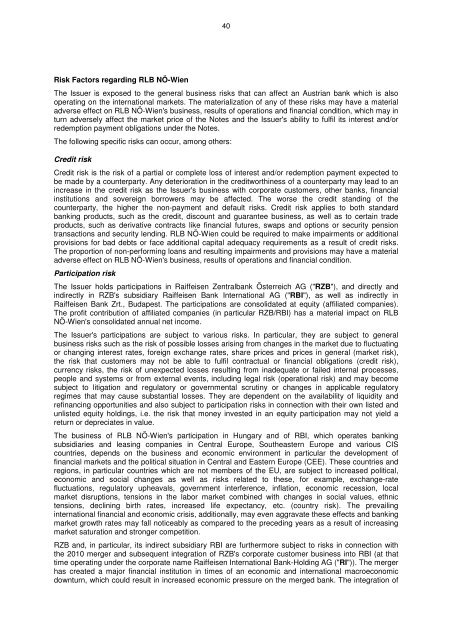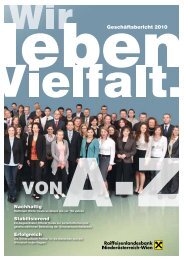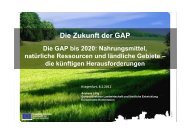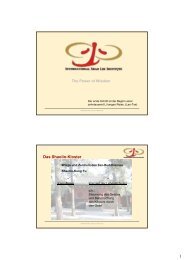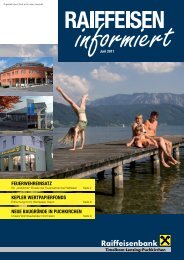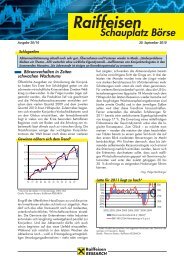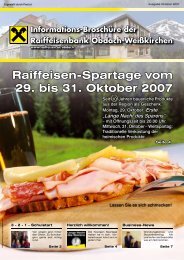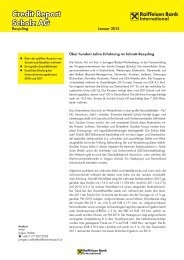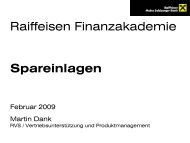RAIFFEISENLANDESBANK NIEDERÖSTERREICH-WIEN AG
RAIFFEISENLANDESBANK NIEDERÖSTERREICH-WIEN AG
RAIFFEISENLANDESBANK NIEDERÖSTERREICH-WIEN AG
You also want an ePaper? Increase the reach of your titles
YUMPU automatically turns print PDFs into web optimized ePapers that Google loves.
Risk Factors regarding RLB NÖ-Wien<br />
40<br />
The Issuer is exposed to the general business risks that can affect an Austrian bank which is also<br />
operating on the international markets. The materialization of any of these risks may have a material<br />
adverse effect on RLB NÖ-Wien's business, results of operations and financial condition, which may in<br />
turn adversely affect the market price of the Notes and the Issuer's ability to fulfil its interest and/or<br />
redemption payment obligations under the Notes.<br />
The following specific risks can occur, among others:<br />
Credit risk<br />
Credit risk is the risk of a partial or complete loss of interest and/or redemption payment expected to<br />
be made by a counterparty. Any deterioration in the creditworthiness of a counterparty may lead to an<br />
increase in the credit risk as the Issuer's business with corporate customers, other banks, financial<br />
institutions and sovereign borrowers may be affected. The worse the credit standing of the<br />
counterparty, the higher the non-payment and default risks. Credit risk applies to both standard<br />
banking products, such as the credit, discount and guarantee business, as well as to certain trade<br />
products, such as derivative contracts like financial futures, swaps and options or security pension<br />
transactions and security lending. RLB NÖ-Wien could be required to make impairments or additional<br />
provisions for bad debts or face additional capital adequacy requirements as a result of credit risks.<br />
The proportion of non-performing loans and resulting impairments and provisions may have a material<br />
adverse effect on RLB NÖ-Wien's business, results of operations and financial condition.<br />
Participation risk<br />
The Issuer holds participations in Raiffeisen Zentralbank Österreich <strong>AG</strong> ("RZB"), and directly and<br />
indirectly in RZB's subsidiary Raiffeisen Bank International <strong>AG</strong> ("RBI"), as well as indirectly in<br />
Raiffeisen Bank Zrt., Budapest. The participations are consolidated at equity (affiliated companies).<br />
The profit contribution of affiliated companies (in particular RZB/RBI) has a material impact on RLB<br />
NÖ-Wien's consolidated annual net income.<br />
The Issuer's participations are subject to various risks. In particular, they are subject to general<br />
business risks such as the risk of possible losses arising from changes in the market due to fluctuating<br />
or changing interest rates, foreign exchange rates, share prices and prices in general (market risk),<br />
the risk that customers may not be able to fulfil contractual or financial obligations (credit risk),<br />
currency risks, the risk of unexpected losses resulting from inadequate or failed internal processes,<br />
people and systems or from external events, including legal risk (operational risk) and may become<br />
subject to litigation and regulatory or governmental scrutiny or changes in applicable regulatory<br />
regimes that may cause substantial losses. They are dependent on the availability of liquidity and<br />
refinancing opportunities and also subject to participation risks in connection with their own listed and<br />
unlisted equity holdings, i.e. the risk that money invested in an equity participation may not yield a<br />
return or depreciates in value.<br />
The business of RLB NÖ-Wien's participation in Hungary and of RBI, which operates banking<br />
subsidiaries and leasing companies in Central Europe, Southeastern Europe and various CIS<br />
countries, depends on the business and economic environment in particular the development of<br />
financial markets and the political situation in Central and Eastern Europe (CEE). These countries and<br />
regions, in particular countries which are not members of the EU, are subject to increased political,<br />
economic and social changes as well as risks related to these, for example, exchange-rate<br />
fluctuations, regulatory upheavals, government interference, inflation, economic recession, local<br />
market disruptions, tensions in the labor market combined with changes in social values, ethnic<br />
tensions, declining birth rates, increased life expectancy, etc. (country risk). The prevailing<br />
international financial and economic crisis, additionally, may even aggravate these effects and banking<br />
market growth rates may fall noticeably as compared to the preceding years as a result of increasing<br />
market saturation and stronger competition.<br />
RZB and, in particular, its indirect subsidiary RBI are furthermore subject to risks in connection with<br />
the 2010 merger and subsequent integration of RZB's corporate customer business into RBI (at that<br />
time operating under the corporate name Raiffeisen International Bank-Holding <strong>AG</strong> ("RI")). The merger<br />
has created a major financial institution in times of an economic and international macroeconomic<br />
downturn, which could result in increased economic pressure on the merged bank. The integration of


